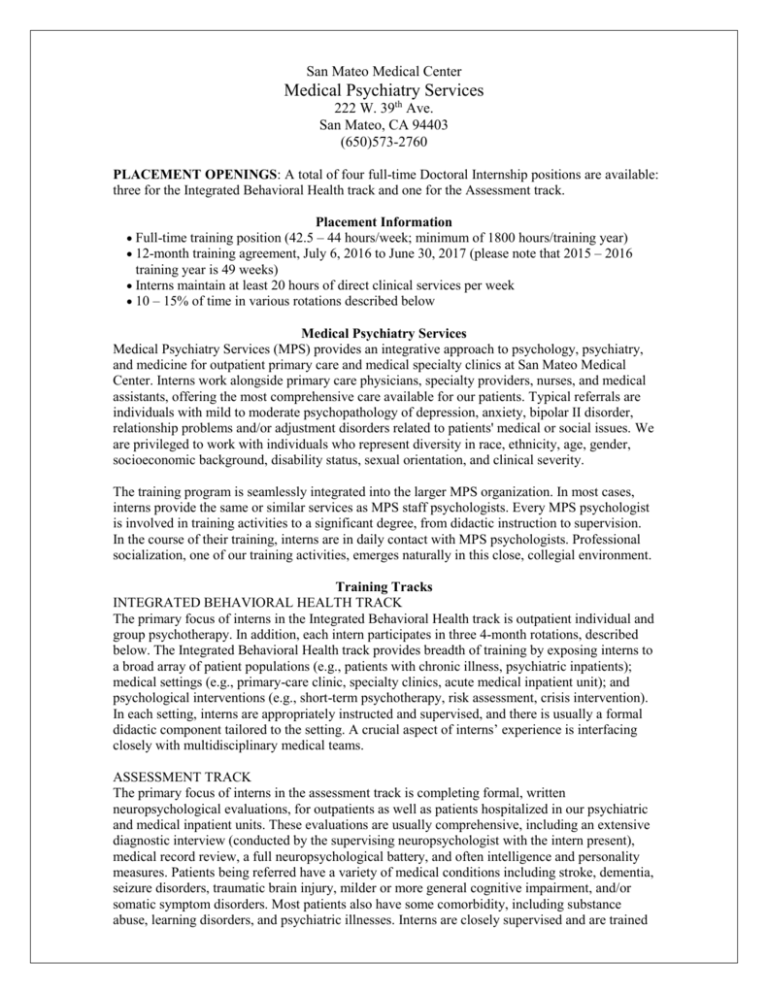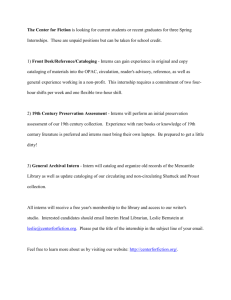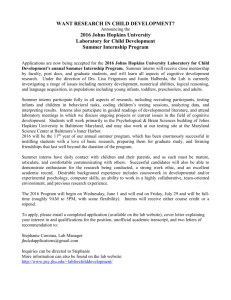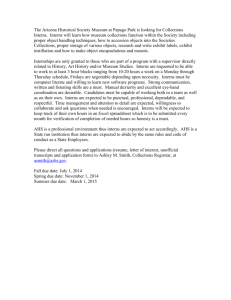here. - San Mateo Medical Center Psychology Training Programs
advertisement

San Mateo Medical Center Medical Psychiatry Services 222 W. 39th Ave. San Mateo, CA 94403 (650)573-2760 PLACEMENT OPENINGS: A total of four full-time Doctoral Internship positions are available: three for the Integrated Behavioral Health track and one for the Assessment track. Placement Information Full-time training position (42.5 – 44 hours/week; minimum of 1800 hours/training year) 12-month training agreement, July 6, 2016 to June 30, 2017 (please note that 2015 – 2016 training year is 49 weeks) Interns maintain at least 20 hours of direct clinical services per week 10 – 15% of time in various rotations described below Medical Psychiatry Services Medical Psychiatry Services (MPS) provides an integrative approach to psychology, psychiatry, and medicine for outpatient primary care and medical specialty clinics at San Mateo Medical Center. Interns work alongside primary care physicians, specialty providers, nurses, and medical assistants, offering the most comprehensive care available for our patients. Typical referrals are individuals with mild to moderate psychopathology of depression, anxiety, bipolar II disorder, relationship problems and/or adjustment disorders related to patients' medical or social issues. We are privileged to work with individuals who represent diversity in race, ethnicity, age, gender, socioeconomic background, disability status, sexual orientation, and clinical severity. The training program is seamlessly integrated into the larger MPS organization. In most cases, interns provide the same or similar services as MPS staff psychologists. Every MPS psychologist is involved in training activities to a significant degree, from didactic instruction to supervision. In the course of their training, interns are in daily contact with MPS psychologists. Professional socialization, one of our training activities, emerges naturally in this close, collegial environment. Training Tracks INTEGRATED BEHAVIORAL HEALTH TRACK The primary focus of interns in the Integrated Behavioral Health track is outpatient individual and group psychotherapy. In addition, each intern participates in three 4-month rotations, described below. The Integrated Behavioral Health track provides breadth of training by exposing interns to a broad array of patient populations (e.g., patients with chronic illness, psychiatric inpatients); medical settings (e.g., primary-care clinic, specialty clinics, acute medical inpatient unit); and psychological interventions (e.g., short-term psychotherapy, risk assessment, crisis intervention). In each setting, interns are appropriately instructed and supervised, and there is usually a formal didactic component tailored to the setting. A crucial aspect of interns’ experience is interfacing closely with multidisciplinary medical teams. ASSESSMENT TRACK The primary focus of interns in the assessment track is completing formal, written neuropsychological evaluations, for outpatients as well as patients hospitalized in our psychiatric and medical inpatient units. These evaluations are usually comprehensive, including an extensive diagnostic interview (conducted by the supervising neuropsychologist with the intern present), medical record review, a full neuropsychological battery, and often intelligence and personality measures. Patients being referred have a variety of medical conditions including stroke, dementia, seizure disorders, traumatic brain injury, milder or more general cognitive impairment, and/or somatic symptom disorders. Most patients also have some comorbidity, including substance abuse, learning disorders, and psychiatric illnesses. Interns are closely supervised and are trained in test administration, scoring, and interpretation, as well as close review of all report preparation. After suitable training, interns typically test patients over one or more sessions independently. After the written evaluation is completed, the patient returns to review the results with the supervising neuropsychologist and the intern in a feedback session. Training in the Neuro seminar (which is also attended by Integrated Behavioral Health interns) focuses on brain/behavior relationships, neuroanatomy, and neuropsychological disorders. Neuropsychology is a broad and highly technical field, and interns are expected to educate themselves independently on particular subjects as necessary (e.g., signs of frontotemporal dementia, sequelae of TBI). Interns are expected to complete 25-30 evaluations over the course of the year. Training Location San Mateo Medical Center (SMMC) is an approximately 100-bed county hospital that provides inpatient and outpatient medical and psychiatric services to low-income individuals residing within San Mateo County. Our Medical Psychiatry Services (MPS) work in partnership with primary care and specialty clinics to integrate psychology, psychiatry, and behavioral medicine in the care of a culturally and linguistically diverse patient population. We provide both clinical and assessment services to the hospital and certain affiliated clinics. Training Rotations YEAR-LONG TRAINING AND DUTIES A. INTEGRATED BEHAVIORAL HEALTH TRACK Throughout the year, Integrated Behavioral Health interns carry a caseload of individual therapy outpatients, averaging 20-25 at any one time. In addition, interns conduct 3-4 intake evaluations per week. A majority of the clinical presentations we encounter are depression, anxiety, and adjustment disorders related to patients’ medical, psychological, and/or social issues. We also commonly encounter trauma history and relational issues. (Patients with severe mental illness, acute substance use, or criminal justice involvement are referred to other, more specialized county mental health agencies.) Our patient population is very diverse, and a significant minority of our patients are monolingual Spanish speakers. For them, we provide Spanish-speaking clinicians, or telephonic interpreter services. (Interpreter services are also available in many other languages). The clinic utilizes a short-term, biopsychosocial model of psychotherapy; however, interns are also able to see a few patients for long-term treatment. On occasion, interns will have the opportunity to provide couples therapy, neuropsychological evaluations, and/or personality testing according to the patients’ needs. Throughout the year, Integrated Behavioral Health interns design and co-facilitate outpatient therapy groups, generally 8-12 weeks in length. Past groups include: Managing Depression and Anxiety, Mindfulness, Acceptance and Commitment Therapy (ACT), Weight Management, and Diabetes and Hepatitis C support groups. A number of psychotherapy groups are offered in Spanish. B. ASSESSMENT TRACK As elaborated above, the focus for Assessment track interns is completing comprehensive neuropsychological evaluations for both outpatients and, less often, inpatients. However, because our program strives to train well-rounded clinicians, Assessment interns also receive considerable psychological intervention training and experience. Each Assessment track intern: (1) carries a small caseload of individual therapy patients; (2) receives one hour of delegated (therapy) supervision per week; (3) attends all didactic trainings as well as group supervision; (4) has the opportunity to co-facilitate outpatient therapy groups; and (5) is expected to complete all clinical rotations. 2 YEAR-LONG TO 6-MONTH LONG CLINICAL ROTATIONS Each Intern will serve on all three clinical rotations during the training year, and will be on two rotations at any given time. The Interns’ primary rotation will be 12 months, and their secondary rotations will be 6 months, switching at mid-year. The clinical service rotations are as follows: Inpatient Medical Service: This rotation provides services to the following units: 1) Consultation Liaison: Providing comprehensive psychological care for patients on the acute inpatient and long-term care medical units. Under the guidance of a psychiatrist, interns learn the skills of chart reading, acute psychiatric assessment, and medical note writing, and have the opportunity to follow patients for the duration of their hospitalization. Interns often consult and collaborate with physicians, nurses, and social workers. Psychiatry rounds take place twice a week, with one additional 45-minute meeting dedicated to didactic training. Didactic topics range from medical issues such as dementia, delirium, cardiac, endocrine, or gastroenterology issues, to legal and ethical matters such as psychiatric holds and decision-making capacity. 2) Palliative Care: Providing consultation and supportive services for patients and families facing end-of-life issues. San Mateo Medical Center’s Palliative Care unit provides interdisciplinary, culturally sensitive care to our patients with life-limiting illnesses. Interns provide compassionate care and psychosocial support for our patients and their family members to alleviate pain, grief, and emotional discomfort. Treatment with patients and their family members ranges from a few visits to several months of therapy. The palliative care team meets weekly to discuss patient cases and to learn more about end-of-life issues. Inpatient Psychiatric Services – Group Therapy: The inpatient psychiatric unit at San Mateo Medical Center is a 34-bed locked facility providing care and stabilization for patients with acute psychiatric illnesses. Patient diagnoses include schizophrenia, bipolar I disorder, psychosis, severe depression, and severe personality disorders. The group therapy rotation allows interns the opportunity to work closely with these patients, and also to interact with psychiatrists, nursing staff, and discharge planners. Groups are designed and co-facilitated by the psychology interns. Past groups include: mindfulness, coping strategies, psycho-education, cognitive behavioral techniques, and dialectical behavioral therapy. Interns are expected to design and run two or three groups per week. Interns also have the opportunity to see patients for individual supportive and/or solution-focused therapy. Behavioral Medicine: This rotation integrates specialty providers and the behavioral team to offer comprehensive care to our patients with chronic illness. Interns provide short-term treatment targeting chronic medical conditions (e.g., diabetes, heart disease). We provide immediate assistance as well as treatment options (individual, group, and medication referral) to help patients to effectively manage the psychosocial issues associated with their chronic illness. Weekly supervision with a specialized psychologist is provided, along with empirical data to track the progress of patients and the clinic as a whole. Interns in this rotation are available to medical staff on an on-call basis to respond to any urgent psychological patient needs. Interns utilize crisis interventions and conduct brief assessments to support the patient and/or staff member. Being knowledgeable and efficient with diagnosis and crisis management is necessary in this role and these positions are highly visible within the medical center. Training Goals A primary focus of training is brief individual and group psychotherapy in a medical context. Our model is best described as practitioner-scholar, with an emphasis on research-supported clinical practice. Our approach is integrationist and broadly biopsychosocial, incorporating different theories and orientations, while always keeping in mind individual patient characteristics (including cultural considerations) and preferences. We recognize, as well, that individual intern characteristics and preferences are an important consideration in training. Training, like therapy, 3 is a process that works best when it is flexible and individualized. Our goal is to help interns develop their own perspective on brief psychotherapy, while providing the didactic, supervisory, and experiential opportunities to move them closer to integrating evidence-based frameworks and techniques. Other foci of training include clinical assessment, crisis intervention, psychoeducation, and collaboration with multidisciplinary medical teams. With regard to neuropsychological assessments, there is an emphasis on choosing, administering, and interpreting empirically validated measures in a clinically and culturally sensitive but largely standardized approach. The use of contemporary peer-reviewed research in neuropsychology informs assessment methodology, case formulation, and treatment recommendations. Our overarching training program goals and objectives are as follows: Goal 1: Help prepare our interns to be competent, ethical clinical psychologists. By the end of the training year, interns will be expected to: a) Demonstrate awareness, knowledge, and appreciation of the role of cultural and individual diversity in the professional practice of psychology. b) Demonstrate the ability to conduct competent psychological intakes/assessments/evaluations. (Assessment track: perform competent neuropsychological evaluations.) c) Demonstrate the ability to provide competent case formulations and choose appropriate, empirically-supported interventions. d) Demonstrate understanding of applicable laws and ethical principles. e) Demonstrate appropriate professionalism and socialization within the field of psychology, including appropriate use of supervision. Goal 2: Produce clinicians who can work effectively and ethically in a multidisciplinary medical environment. Toward this end, we strive to develop interns’ abilities to: a) Collaborate and communicate assertively and respectfully with medical providers, in person and in writing. b) Gain the requisite medical knowledge to effectively treat patients with, e.g., chronic health conditions (Assessment track: gain the requisite knowledge to understand brainbehavior correlations as they pertain to relevant neurological damage/disorders). c) Understand and employ the principles of Integrated Behavioral Health. d) Gain experience and comfort working in outpatient clinic, medical inpatient, and psychiatric inpatient settings. e) Function increasingly independently in their roles as mental health providers in a medical setting. Program’s Expectation for Intern Performance Our internship program aims to provide empirically based, culturally sensitive, diverse mental health training. Our primary goals are to help prepare interns to be competent, ethical clinical psychologists and to produce clinicians that can work effectively and ethically in a multidisciplinary medical environment. Interns are expected to demonstrate the following competencies: (a) appreciation of individual and cultural differences as they affect psychology and the psychotherapeutic relationship; (b) utilization of research literature and personal competencies to choose appropriate empirically-supported interventions; (c) ability to establish and maintain rapport in therapy, and deliver empirically-supported time-limited treatments; (d) knowledge of the medical and psychological aspects of chronic health conditions; (e) ability to function as a member of a multidisciplinary team; (f) familiarity with APA ethics code; (g) ability to seek consultation with supervisor regarding ethical issues if/and when appropriate; (h) ability to manage his or her clinical schedule and provide outreach to patients and community agencies; (i) ability to provide succinct and accurate notes for the medical record. 4 Our training program highly values continuous feedback to interns focused on their clinical and professional growth. Supervisors complete mid-year and end-of-year (January and June) written evaluation forms, which are reviewed and discussed with supervisees. Based on these evaluations, intern specific goals and expectations are revisited. In addition to this evaluation process, trainees will receive regular feedback through the course of their training year in supervision sessions. The Training Director is informed of any concerns related to intern competencies, and becomes involved as appropriate. Work Schedule Most internship hours are completed Monday through Friday, between 8am and 5pm. Some rotations may allow evening hours, but these instances are infrequent and are subject to supervisor approval. Interns may not work more than 44 hours per week. Interns are asked to complete their Supervised Professional Experience (SPE) log on a weekly basis and to provide a copy of their SPE log to the training director at the end of each month. Sample Weekly Training Schedule Direct Clinical Service: 12 hours of face-to-face outpatient psychotherapy (individual and group) 4-5 hours of intake/assessment/consultation services 3-5 hours on clinical rotation Training and Supervision: 2 hours of individual supervision (in-person with primary and delegated supervisor) 2 hours of group supervision 2 hours didactic seminar; this includes 2.5 hours per month of Psychiatry Grand Rounds 1 hour training on group therapy 1-3 hours training on clinical rotation Clinical Support and Professional Development: 0.5 hour case consultation/schedule coordination meeting per day 1 hour staff meeting 6 hours for documentation/administrative duties (e.g. outreach calls, email) 2 hours for research/dissertation Seminar topics include topics related to Health Psychology, Assessment/Neuropsychology, and Professional Development. Didactic seminars are presented by staff psychologists, psychiatrists, other licensed medical and mental health professionals, and Psychology Post-Doctoral Fellows. Compensation Interns receive a regionally-competitive stipend of $25,000 for the 2016 – 2017 training year. Interns also receive a monthly credit if using public transportation. Holidays and Leave Interns may take up to 15 days of personal and professional leave time during the internship, in addition to designated San Mateo County holidays. Professional leave time for conferences, dissertation-related needs, and Post-Doctoral interviews may be credited as internship hours but requests must be reasonable, made in advance and in writing, and cleared by the primary supervisor and training director. Training Resources Designated psychotherapy offices are located in outpatient clinics in the hospital. All services and most training activities are provided on hospital premises. Interns are provided with a shared intern office space, which includes computers, printer, and lounge area. For Assessment track 5 interns, all testing materials are available in the MPS staff neuropsychologist’s office and/or the intern office. Interns are responsible for clerical duties such as documentation, scheduling, and outreach to patients; however, full-time clerical support is provided throughout the training year. Interns also have access to San Mateo Health System’s online library, which consists of several medical and psychiatry resources. How to Apply Applicants applying to our Doctoral Internship program are asked to submit application materials via the AAPI online service and must include: (a) Completed AAPI (APPIC Application for Psychology Internship) – this application can be accessed through the Applicant Portal on the APPIC website (b) Curriculum Vitae (c) Three letters of recommendation, including at least two from clinical supervisors who are familiar with your clinical work. (d) Letter of intent detailing which internship training track (i.e., Integrated Behavioral Health track or Assessment track) you are applying to (e) For the Assessment track only; one de-identified neuropsychological evaluation, ideally full-battery. (f) All application materials must be uploaded to AAPI online by Friday, December 4th at 5pm. Selection Process Applications will be reviewed by clinical staff members and selected applicants will be contacted for an on-site interview. Some exceptions may be made for phone interviews. Special consideration will be given to bilingual, Spanish-speaking applicants. Progress Towards Accreditation Medical Psychiatry Services psychology internship is a member of APPIC and will begin developing an APA accreditation application in October 2015. Medical Psychiatry Services Clinical Staff Program Director: David Lin, Psy.D. Training Director: Charlene Fuentes, Psy.D. Assistant Training Director: Maria Moran, Psy.D. Assessment Track Supervisor: Joshua Vanderschaaf, Psy.D. Janele Auranicky, Psy.D. Alysia Cirona-Singh, M.D. Rachel Hawkins, Psy.D. Daniele Levy, Ph.D. Janice Raj, Psy.D. Christian Washburn, Psy.D. If you would like more information or have any questions related to our psychology internship program, please contact MPS Training Director: Charlene Fuentes, Psy.D. Phone: (650) 573-2699 Email: cfuentes@smcgov.org 6






